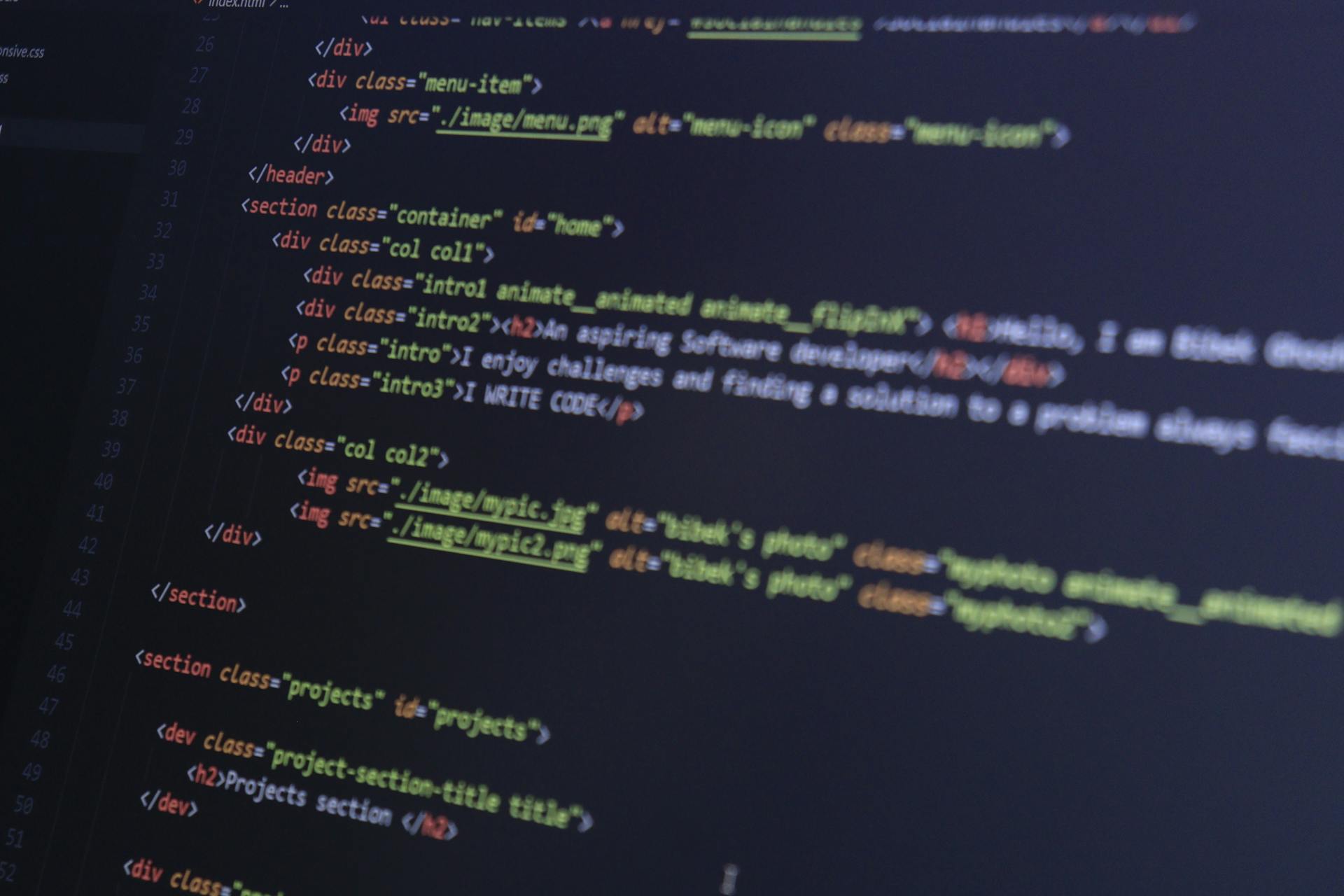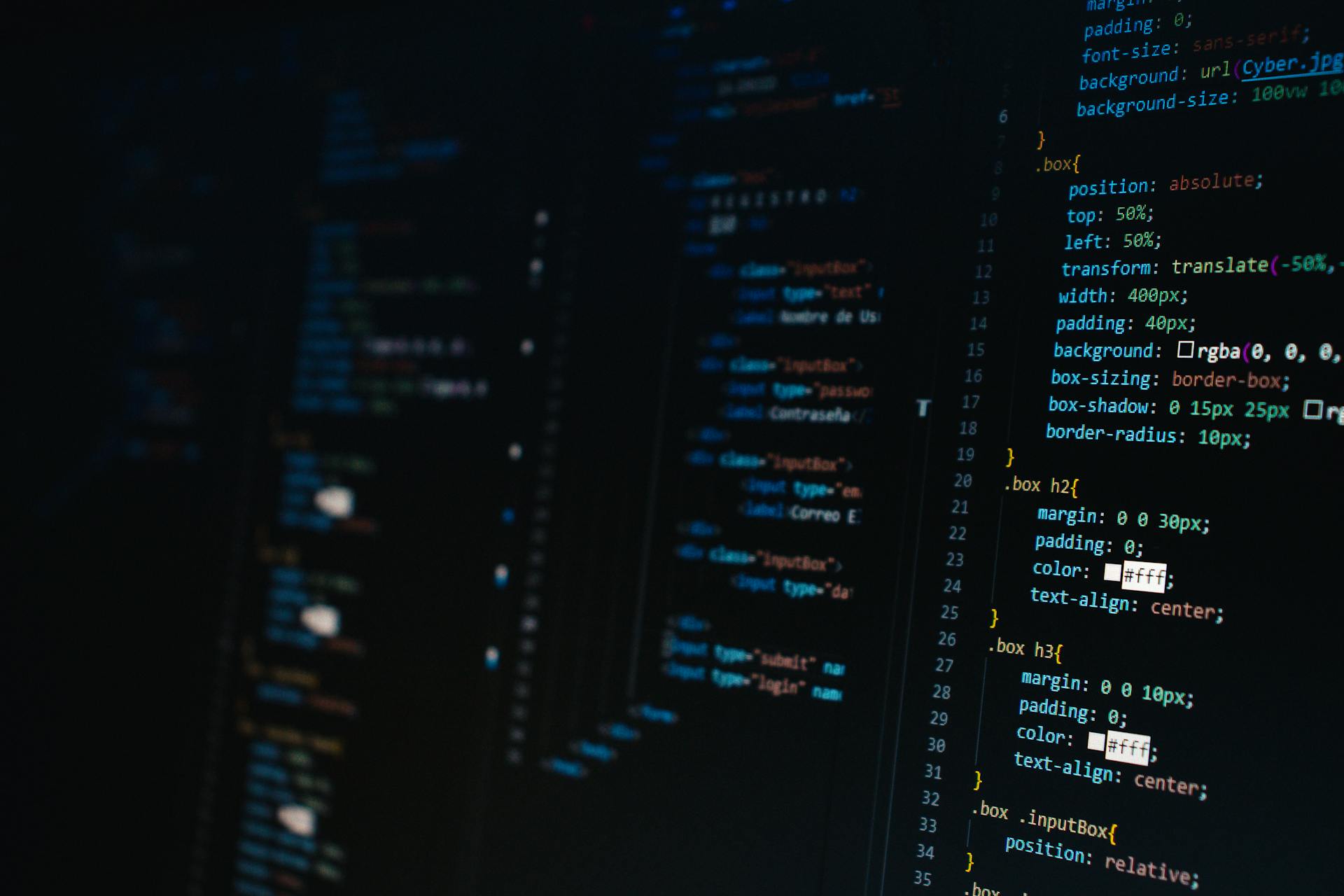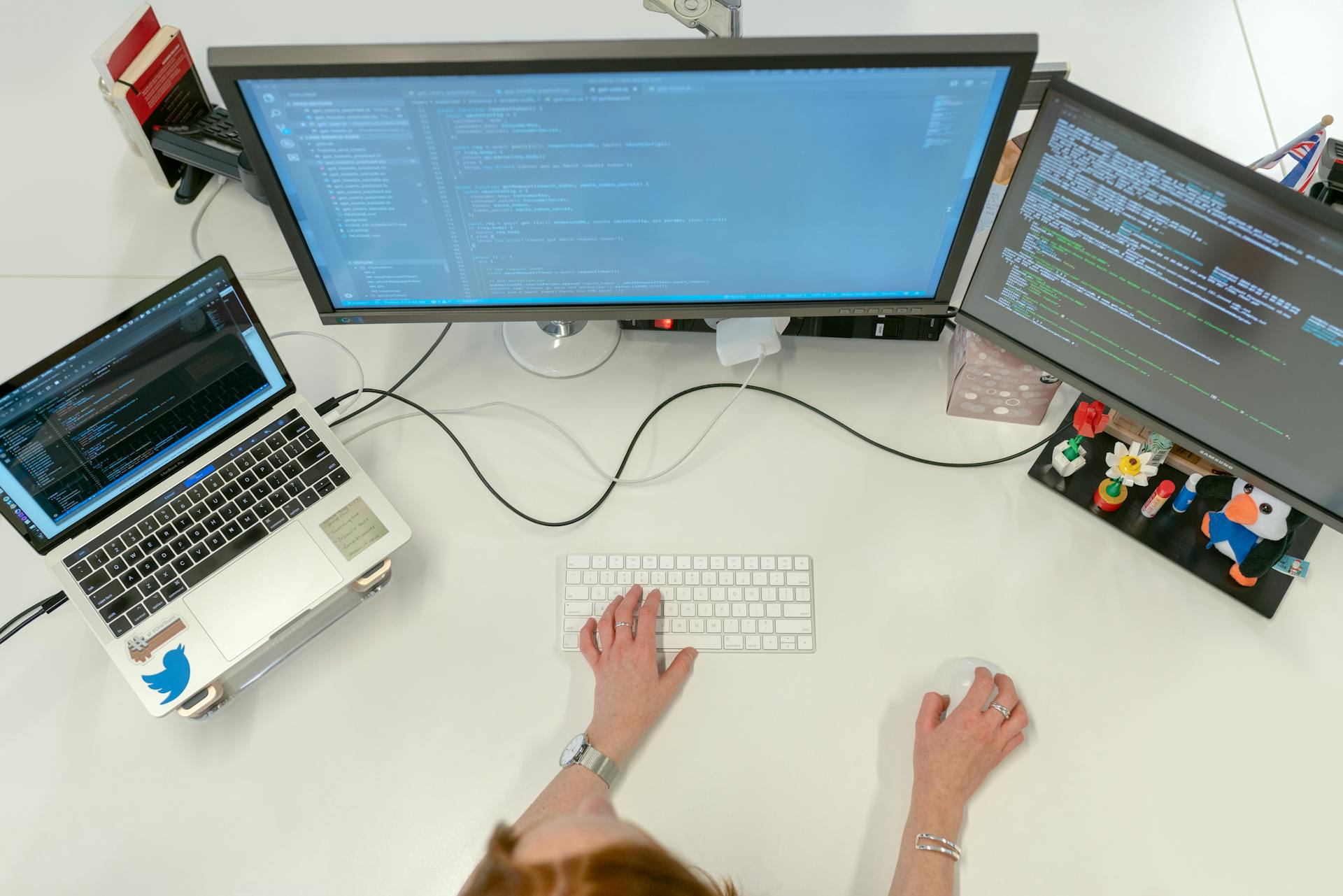
Learning to code on your own can be a daunting task, but with the right resources, you can make great progress. The internet is full of free resources that can help you learn to code, from online courses to coding communities.
Codecademy is a popular online platform that offers interactive coding lessons in a variety of programming languages, including Python, JavaScript, and HTML/CSS. You can learn at your own pace with Codecademy's flexible learning environment.
With dedication and consistent practice, you can make significant progress in a short amount of time. For example, you can start building simple projects within a few weeks of learning the basics of a programming language.
See what others are reading: Learn Morse Code Online
Learning Platforms
Learning Platforms can be a great way to start your coding journey. Cave of Programming is a website offering video courses on various programming topics like Perl, C++, Android, and Java, all taught by experienced developer John Purcell.
Some of these courses are even available for free, making it a fantastic resource for beginners. Programiz is another great option, providing coding courses, challenges, tutorials, references, and examples for various programming languages, including C++.
If you're looking to learn C++ specifically, Programiz offers free tutorials, examples, and reference materials to get you started.
Readers also liked: Learn How to Code Google's Go Golang Programming Language
org
Code.org is a non-profit organization dedicated to making coding lessons more accessible and increasing diversity in the tech field. It offers free coding lessons in over 60 languages, perfect for students and schools.
One of the things that sets Code.org apart is its focus on accessibility. The organization's courses are divided into three main categories: Grades K-5, Grades 6-12, and Beyond K-12, making it easy to find the right level of coding education for any student.
Programiz is another learning platform that's geared towards programmers. It offers a wide range of coding courses, challenges, and tutorials, including resources on C++ programming.
If you're looking for a platform that caters to programmers, Programiz is a great option. However, keep in mind that some of its features, like courses and challenges, are only available to Pro users.
Here are some specific features to look out for on these platforms:
- Code.org: Offers free coding lessons in over 60 languages, suitable for students and schools.
- Programiz: Provides a wide range of coding courses, challenges, and tutorials, including resources on C++ programming.
Functions
Functions are the building blocks of programming, allowing you to break down complex tasks into smaller, reusable steps. This approach promotes modular code and reduces the repetition of code.
Functions are like mini-programs within your program, as mentioned in the basics of programming. They can be called from multiple places in a program, making them highly reusable.
One of the key benefits of using functions is the Don't Repeat Yourself (DRY) principle, which helps keep your code clean and organized. This is achieved by encapsulating complex logic in a single function, such as the calculateTax() function mentioned earlier.
Functions also improve readability by giving names to steps, making it easier for others to understand your code. This is especially important when working on complex projects with multiple developers.
Here are some benefits of using functions:
- DRY code - Don't Repeat Yourself
- Reusability - Functions can be called anywhere
- Readability - Gives names to steps
- Encapsulation - Hides complex details
As programs get more advanced, functions become critical for managing complexity. They help you to break down complex tasks into smaller, manageable pieces, making it easier to write and maintain your code.
Full Stack Web Development
Learning Full Stack Web Development is a great way to become a well-rounded developer. You can learn skills like database design, server configuration, and API development.
To become a full stack developer, consider expanding beyond front-end or back-end development. This allows you to understand the entire architecture of a web application.
Full stack projects greatly improve overall abilities. You'll get hands-on experience with various technologies and be able to tackle complex problems.
To get started, learn JavaScript, a versatile language that runs practically everywhere, especially in web browsers. With JavaScript, you can add dynamic interactivity to websites and build full stack web apps by combining with HTML/CSS.
Here are some key skills to focus on as a full stack developer:
- Database design
- Server configuration
- API development
The key to mastering full stack development is to never stop learning. Consume coding content daily, experiment with new technologies, challenge yourself with projects, and engage with the community.
Selecting a Programming Language
Python is a great choice for beginners as its syntax is very clear, making it easy to learn and understand.
Choosing the right programming language is crucial when starting to learn programming. Each language has its strengths, so consider what you want to achieve or your interests and start coding accordingly.
For another approach, see: Genetic Programming
Research the industries and roles that really appeal to you, then pick a language that aligns with those aspirations for a career.
Python is great for beginners as the syntax is very clear. This language finds application in web development, data science, and automation.
JavaScript is versatile and runs in any browser, making it a valuable language to learn if you're interested in front-end development.
Here are some popular and beginner-friendly programming languages to consider:
- Python: great for beginners and finds application in web development, data science, and automation
- JavaScript: versatile and runs in any browser, great for front-end development
- Java: portable across platforms, common in Android app and enterprise solution development
- C++: suitable for system-software development and game programming
- Ruby: simple, strong, and great for web development overall
Online Courses and Tutorials
Online courses and tutorials are a great way to learn to code on your own. You can find a wealth of resources online, from free coding tutorials to comprehensive online courses.
Some popular online courses include Udemy, Coursera, and edX, which offer a wide range of courses on various programming languages and topics. For example, Udemy offers over 170,000 free and paid courses, including classes on web development, data science, and machine learning. Coursera, on the other hand, partners with over 200 universities and companies to provide thousands of courses on various subjects, including computer science.
If you're looking for more specialized courses, you can also check out platforms like Codecademy, which offers interactive coding courses in various programming languages, or GeeksforGeeks, which provides articles, quizzes, tutorials, and courses on programming and computer science.
A unique perspective: Computer Science Machine Learning
Udemy
Udemy is an online education website that offers a wide range of courses on various topics, including web development, data science, and machine learning. It has over 170,000 free and paid courses to choose from.
Udemy provides a variety of courses, from beginner to advanced levels, allowing learners to pick and choose what suits them best. Some examples of courses available on Udemy include "Web Development by Doing: HTML / CSS From Scratch" and "Build Your First Website in 1 Week With HTML5 and CSS3".
One of the benefits of taking a course on Udemy is the flexibility it offers. Learners can choose to take a course that fits their schedule and learning style.
Here are some courses available on Udemy:
- Web Development by Doing: HTML / CSS From Scratch
- Build Your First Website in 1 Week With HTML5 and CSS3
Udemy's courses are taught by experienced instructors who provide high-quality content and support. Learners can also interact with other students and instructors through forums and discussions.
Udemy's pricing varies depending on the course, but it offers a free trial period for paid courses. Learners can choose to pay for a course upfront or subscribe to Udemy's premium plan for access to more courses and features.
C++ and SQL
C++ is a powerful language for system-level programming, often used for operating systems and games. It's a great choice for those who want to dive deeper into programming beyond the basics.
C++ is less common for absolute beginners, but it's definitely worth considering if you have specific goals in mind. For example, if you're interested in game development or building operating systems.
SQL provides the foundations for database management, which is essential for dynamic websites. This means that SQL is a must-know for anyone interested in web development.
Python, HTML/CSS, and JavaScript are popular beginner-friendly picks that can open lots of doors. They're great choices for those who want to start with the basics and then move on to more advanced topics.
Recommended read: Learning Systems in Machine Learning
Free Resources
Free resources are abundant, and you can learn to code without breaking the bank. Websites like freeCodeCamp, Codecademy, and W3Schools offer free coding tutorials.
You can also find free coding resources on YouTube, where channels like Traversy Media, Academind, and FreeCodeCamp share video tutorials that make learning to code a breeze.
You might like: Medical Coding Schools
Interactive coding websites like GeeksforGeeks, freeCodeCamp, and HackerRank provide coding challenges that help you practice and develop problem-solving skills.
There are also many free online courses available, such as those offered by Coursera, edX, and MIT, which can be a great way to learn a new programming language or skill.
If you prefer to learn from books, you can find free coding PDFs and eBooks online, such as the "Coding Essentials Guidebook for Developers" by Raspberry Pi.
Here's a list of some popular free coding resources:
- freeCodeCamp: Offers hundreds of hours of free lessons on various programming topics, including JavaScript.
- Codecademy: Offers free courses across multiple languages, including Python, Java, JavaScript, and SQL.
- W3Schools: Provides free coding tutorials and reference materials for web development.
- YouTube: Channels like Traversy Media, Academind, and FreeCodeCamp offer free video tutorials.
- GeeksforGeeks: Offers free coding challenges, tutorials, and reference materials.
- HackerRank: Provides coding challenges and a platform for students to participate in discussions and share solutions.
Remember, the key to learning to code on your own is to stay focused, set achievable learning goals, and actively engage with the material. Consistency is key, so allocate dedicated time for learning from these resources regularly.
Getting Started
Getting Started is the most crucial part of learning to code on your own. To begin, set realistic goals based on your skills, interests, and time commitments. This will help you stay motivated and focused throughout your learning journey.
You can start with free online coding courses like Codecademy, freeCodeCamp, and W3Schools, which offer interactive tutorials and coding challenges to help you learn at your own pace. These platforms remove financial barriers to coding education and provide a great starting point for beginners.
To stay on track, join online developer communities like GitHub, Stack Overflow, and Reddit to connect with other coders, get feedback, and troubleshoot issues. Remember to start small, focus on one language at a time, and practice coding daily to build fundamental programming knowledge.
Here are some beginner-friendly programming languages to consider:
- Python
- JavaScript
- Ruby
These languages are great for beginners because they have human-friendly syntax and expressions, making it easier to learn and remember.
Great
Getting started with coding can be overwhelming, but there are many resources available to help you learn. FutureLearn, an online learning platform, offers free and paid courses from world-class universities and organizations.
You can choose from a variety of subjects, including IT and computer science. For example, you can take a course like "Computer Programming for Everyone" or "Introduction to Programming With Python".
If this caught your attention, see: Get Started with Programming
If you're looking for more specialized courses, Great Learning is a great option. They offer hundreds of free courses, including one on how to learn Python. You can also take paid courses, such as "Python Fundamentals for Beginners" or "Python for Machine Learning".
Once you've mastered the basics, consider specializing in an area that interests you. This might be web development, data science, or mobile app development. To get started, you can take on more challenging projects that use more skills and technologies together.
Here are some specific courses and resources to consider:
- Computer Programming for Everyone
- Introduction to Programming With Python
- Python Fundamentals for Beginners
- Python for Machine Learning
Remember, the key to growing as a coder is to keep learning and challenging yourself. Consider tailoring your resume and portfolio to highlight your skills and accomplishments, and practice coding interviews and algorithmic problems to prepare for technical interviews.
Key Steps to Start
To start learning coding from scratch, it's essential to set realistic goals based on your skills, interests, and time commitments. This will help you stay motivated and focused throughout your journey.
To get started, leverage free online coding courses like Codecademy, freeCodeCamp, and W3Schools. These platforms offer interactive lessons and exercises that can help you learn programming concepts without breaking the bank.
Joining online developer communities like GitHub, Stack Overflow, and Reddit can also be incredibly helpful. These communities provide a space to connect with other coders, ask questions, and learn from their experiences.
Choosing a beginner-friendly programming language like Python, JavaScript, or Ruby is also crucial. These languages are relatively easy to learn and have a vast number of resources available.
To practice coding daily, try using tutorials, sample projects, and coding challenges. This will help you apply what you've learned and develop problem-solving skills.
Don't get discouraged if you encounter obstacles along the way. Learning to code takes time and dedication, but with persistence and consistency, you can achieve your goals.
Here are some key steps to get you started:
- Set realistic goals based on your skills, interests, and time commitments
- Leverage free online coding courses
- Join online developer communities
- Choose a beginner-friendly programming language
- Practice coding daily
- Don't get discouraged - learning to code takes time and dedication
Remember, the key is to start small, leverage free resources, and engage with helpful communities to guide you on your coding journey.
Should You Study Computer Science?
Computer science is often misunderstood as being the same as programming, but they're actually quite different. Comp sci involves a lot of discrete math and complicated algorithms, whereas programming is more practical and hands-on.
Many computer science professors aren't great programmers, and that's okay because their job is to prove things with math, not write usable code.
If your goal is mostly practical, you might not want to spend too much time on computer science at first. Programming for a little while and finishing real projects can make advanced algorithms and theories of computation really fascinating.
Starting with advanced topics can be overwhelming, but diving into them after gaining some practical experience can be really rewarding.
Importance of
Learning to code is a game-changer, and it's essential to understand why.
The tech industry offers a vast series of careers, from software development to online data analysts, with decent-paying jobs and potential for growth.
Coding helps you develop problem-solving skills, which is perfect for those who enjoy resolving issues and finding solutions.
Coding is a creative outlet, allowing you to bring your ideas to life and make a difference in the world.
Learning to code can be a positive personal challenge, enhancing your logical thinking, improving problem-solving skills, and giving you confidence.
Here are some of the major reasons to learn how to code:
- Diverse Career Opportunities: opens up a vast series of careers in the tech industry.
- Develop problem-solving skills: helps you devise solutions to problems in the real world.
- Creativity and Innovation: gives you the opportunity to actualize your vision and creativity.
- Personal development: enhances your logical thinking, improves problem-solving skills, and gives you confidence.
Practice and Projects
Practice is essential to mastering coding skills. Start with simple coding exercises and gradually move on to more complex challenges, using websites like GeeksforGeeks, LeetCode, and HackerRank.
Reinforcing your skills through practice makes them stronger and more automatic, just like learning a new sport or musical instrument. Solving different types of problems through practice challenges your thinking and helps you become better at breaking down complex tasks into smaller, manageable parts.
To build confidence in your abilities, practice regularly and don't be discouraged by mistakes - learning from them will help you grow more confident in your programming skills.
A unique perspective: Claude Ai Code
Gym
Practicing with online coding challenges is a great way to improve your skills. Code challenges on platforms like HackerRank can help you hone your programming techniques by practicing data structures, algorithms, math, and machine learning problems across multiple languages.
You can compete in contests to challenge yourself and benchmark your skills against peers. These range from college-level coding competitions to global hackathons.
Developing portfolio-worthy projects by solving real-world problems posed on these platforms is also a great way to prepare for interviews. Many companies use similar online assessments during hiring, so these platforms help ready candidates.
Online platforms like HackerRank offer a variety of challenges to suit different levels of experience. Start easy, tracking your progress and performance over time. Persist through failures - some of the most valuable lessons come from debugging errors!
Here are some benefits of using online coding challenges:
- Improve programming techniques by practicing data structures, algorithms, math, and machine learning problems.
- Compete in contests to challenge yourself and benchmark your skills against peers.
- Develop portfolio-worthy projects by solving real-world problems.
- Prepare for interviews by practicing online assessments.
Practicing with Challenges
Practice coding challenges are a great way to improve your programming skills, and there are many online platforms that offer them. You can find coding challenges on platforms like HackerRank, LeetCode, and GeeksforGeeks.
Suggestion: Schools for Coding
These platforms offer a variety of challenges, from simple to complex, and across multiple programming languages. You can practice coding techniques, data structures, and algorithms, and even compete with others in contests.
Some popular coding challenges include:
Remember, practice makes perfect, so don't be afraid to try new challenges and learn from your mistakes.
Overcoming Challenges
Learning to code on your own can be a challenging but rewarding experience. One of the biggest obstacles you'll face is debugging, which is an integral part of programming.
Debugging can be frustrating, but learning how to use debugging tools and reading error messages is a crucial skill to develop. It's not uncommon to feel overwhelmed by the sheer amount of information available, but breaking your learning into small, manageable portions can make it more digestible.
Subdividing your learning into smaller chunks allows you to focus on one concept at a time, making it feel less overwhelming. This approach also helps you to celebrate your progress and milestones, no matter how small they may seem.
Feeling like an imposter is a common phenomenon, especially when you're just starting out. But remember that everyone starts somewhere, and persistence is key. Don't be too hard on yourself, and let your progress be your motivation.
To stay motivated, set achievable goals and surround yourself with a supportive community or study group. Having peers who can assist and encourage you can make a big difference in your learning journey.
Here are some common challenges you may face and how to overcome them:
- Debugging: Learn to use debugging tools and read error messages.
- Feeling overwhelmed: Break your learning into small, manageable portions.
- Imposter syndrome: Celebrate your progress and milestones.
- Motivation: Set achievable goals and surround yourself with a supportive community.
Sources
- https://www.hostinger.com/tutorials/learn-coding-online-for-free
- https://daily.dev/blog/beginners-guide-how-to-start-learning-coding-from-scratch
- https://www.scotthyoung.com/blog/2019/07/08/learn-to-code/
- https://www.geeksforgeeks.org/how-to-learn-programming/
- https://careerkarma.com/blog/how-to-learn-coding-by-yourself/
Featured Images: pexels.com


